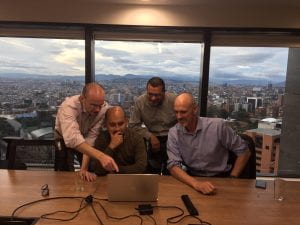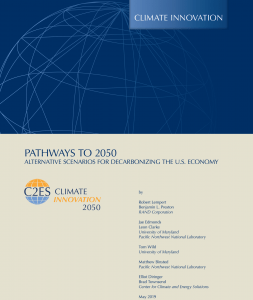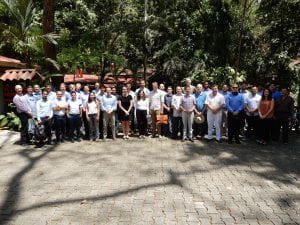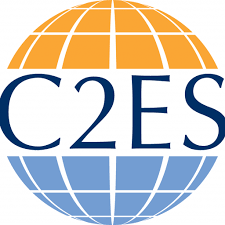Deep Decarbonization
Ongoing
1. Demonstrating the Value of Robust Decision Making in Designing Deep Decarbonization Pathways: A Case Study in Colombia

Team members gather in Bogota, Colombia in 2019 to kick off the project by engaging government stakeholders.

This project seeks to enhance local modeling capacity in Colombia through close collaboration between U.S. and Colombian researchers.
This project seeks to use Robust Decision Making (RDM) methods to identify robust strategies for deep decarbonization in Colombia that perform well under a wide range of future uncertainties. The team will use the Global Change Assessment Model (GCAM) as a forum for exploring the energy-water-land-climate-economic implications of alternative strategies under numerous future uncertainties. The team will then statistically data mine the results to identify policies that are robust to future uncertainty. The project will also include three workshops, the purpose of which will be to engage stakeholders in the analytical process. The first workshop will be geared toward soliciting stakeholder feedback on uncertainties, policy instruments, and performance metrics from various government ministries within Colombia. The second workshop will display preliminary results to stakeholders. The final workshop will present results from the project. The study ultimately aims to provide inputs to current decarbonization policy discussions in Colombia.
Sponsor: Inter-American Development Bank (IDB)
Completed
1. Building Deep Decarbonization Pathways in Latin America and the Caribbean
The DDPP-LAC project is pursuing four intertwined objectives:
• Building enhanced modelling capacities to improve the analyses of country-driven ambitious mitigation strategies;
• Elaborating a set of national scenarios able to inform key policy questions at the crossroads of climate mitigation and domestic development;
• Engaging with domestic policy makers, based on the cross-cutting messages of the country studies; and
• Building a regional network of country research teams, sharing common methodologies and approaches to the development-mitigation challenge.
This will be done by building on the methodological lessons learnt from the the IDDRI-led Deep Decarbonization Pathways Project (DDPP, www.deepdecarbonization.org) and in-country engagement capacity supported by IDB. The first phase of DDPP involved country research teams that already had in-house modelling capacities prior to the project, so the capacity building focused on the way to use these tools to develop scenarios that could be useful for domestic and international discussion with different groups of stakeholders and policymakers. The DDPP-LAC project aims to implement both aspects of capacity building, first by putting more emphasis on the model development itself (through peer training involving the direct participation of modelling experts working in close collaboration with each national team), and second pursuing the support to scenario design built directly from the experience of DDPP Phase I.
Link to Project: https://www.iddri.org/en/project/deep-decarbonization-pathways-latin-america
Sponsor: Institute for Sustainable Development and International Relations (IDDRI)
2. Climate Innovation 2050

Final Report available at https://www.c2es.org/document/pathways-to-2050-scenarios-for-decarbonizing-the-u-s-economy/
This multi-year initiative brought together leading companies across key sectors to develop viable pathways for decarbonizing the U.S. economy. As an initial step, C2ES led a group of companies in a collaborative exercise examining potential scenarios for achieving mid-century decarbonization goals. This scenario exercise aimed to build a common understanding—benefitting both these firms and broader societal efforts—of the potential for alternative pathways to deep decarbonization in the United States and to highlight important commonalities and differences among such paths. This scenario exercise—undertaken in partnership with the RAND Corporation and the Joint Global Change Research Institute, a partnership between the Pacific Northwest National Laboratory and the University of Maryland—can help advance collective understanding in a number of ways. Unlike most previous scenario exercises, it is directly informed by the insights and perspectives of more than 20 leading companies in sectors critical to decarbonizing the U.S. economy, including electric power, transportation, oil and gas, manufacturing, and high-tech. By deepening understanding of the relevant challenges and opportunities, this exercise helps to inform the long-term decision-making of participating companies and, hopefully, the business community at large.
Link to Project: https://www.c2es.org/our-work/climate-innovation-2050/
Sponsor: Center for Climate and Energy Solutions (C2ES)

